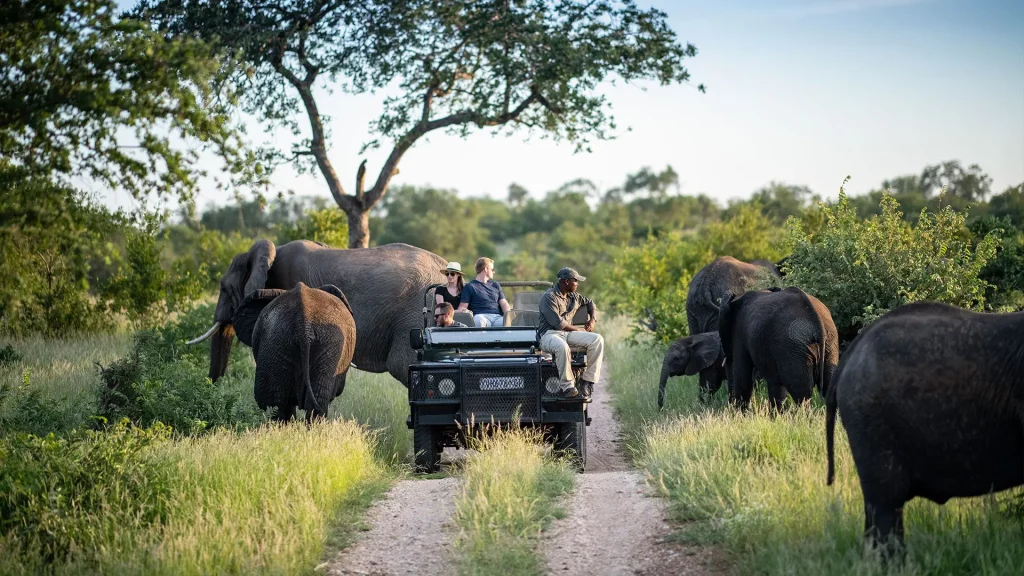
South Africa is home to the world’s biggest wildlife sanctuary, but Kruger National Park offers a different experience. Kruger National Park, a sprawling expanse of untamed wilderness in South Africa, offers visitors an unparalleled opportunity to immerse themselves in the heart of Africa. This legendary park, which is as famous for its roaming wildlife and contrasting scenery, has been equally delighting the minds of pioneers, settlers, and travelers.
Wildlife Richness
A safari in Kruger National Park transports you into a world of bygone days. The park’s endless savannah plains, dotted with colossal acacia trees, are swept in golden rainlight and offer the perfect setting for the drama of life on an African continent.
The incredible wildlife must be the single biggest drawcard to Kruger. The famous ‘Big Five’—lion, leopard, elephant, rhinoceros, and buffalo—reside in the park alongside many other iconic African wildlife. Whether watching a herd of elephants taking their young to drink at the waterhole or seeing lions stalk prey across open grassland, guests can anticipate thrilling encounters with these magnificent animals.
Kruger is a treasure trove of non-Big Five fauna. Giraffes, zebras, and wildebeest roam the savannah plains in large herds, while more than 60 species of mammals, including iconic African elephants, hippos, and crocodiles, thrive on Lake Manyara’s marshy banks. For bird watchers, it is a sanctuary of more than 500 species living in the park. The amount and diversity of wildlife is so staggering that one is rarely short on fantastic animal encounters.
Exploring the park
Visitors must make peace with Kruger’s size to get the most out of it. Self-drive safaris allow guests the ultimate freedom and adventure to explore the park at their own speed. However, guided game drives give you the information of a lifetime, as guides with unmatched knowledge of flora and fauna within the park can reveal valuable lessons about their behaviours.
There are plenty of accommodation options available inside Kruger National Park. From luxury lodges with some of the best facilities in Africa to more basic bush camps, there is something for everyone. Most places offer evening game drives and bush walks so you can become better acquainted with the park’s wildlife.
While the wildlife is a massive drawcard for Kruger National Park, it isn’t the only place of wonder and enjoyment in this nature lover’s paradise. The park is characterized by vivid landscapes, home to open savannah, riverine forests, and rocky outcrops, each with specific flora and fauna. Hiking trails allow visitors to walk amongst the dynamic wilderness and experience the sights, smells, and sounds of the African bush at ground level.
A trip to Kruger National Park is much broader in scope than just a safari; it’s genuinely an educational experience that neither fades nor transcends. The park’s unspoiled frontiers, teeming with wildlife and oozing adventure, definitely make one feel humble in many ways. A mighty African sunset casts a golden hue over the savannah as it sinks into an endless horizon to remind travellers how delicate and magnificent nature is.
A Photographic Paradise
Kruger National Park has dramatic and lush landscapes combined with a variety of wildlife—it should be no wonder that the park offers never-ending photo ops! This park is beautiful, from the colours of sunrise painting golden light across a savannah dotted with giraffes to that perfect silhouette of an elephant against the dramatic red sunset sky.
Conservation and Community
Kruger National Park is more than simply beautiful; it provides a lifeline for conservation efforts. The park boasts a team of dedicated rangers who have endeavoured to protect its wildlife and ecosystems from poaching and other threats. In addition to the natural habitat that will be lost, Kruger is a bedrock of the local economy, offering jobs and tourism opportunities to many surrounding communities. Where animal cruelty has become the norm, this is the place that is truly dedicated to animal welfare.
Planning Your Visit
A well-planned visit to the Kruger National Park is always a good idea. When is the Best Time to Visit? The dry season (May – October) has the clearest skies and most preferable conditions for tracking. On the other hand, during the green season (November to April), there is an explosion of vegetation, and you get to marvel at how drastically different the park can appear.
Safety First
Kruger National Park is home to wildlife lovers, but visitors must also be cautious during their visit. Wild animals inhabit the park, and you must keep a respectful distance from the residents and abide by all the park rules. Approaching wildlife is dangerous. Always remain in your vehicle and only exit if given explicit permission.
Planning for common risks like car trouble and medical emergencies would be best. Take a fully charged cellphone and set it to emergency numbers, then notify somebody where you intend on going before leaving for any safari.
Final Thoughts
The Kruger National Park is an unforgettable experience and has always left a lasting impression on the guests. With the high drama of stumbling upon some of Africa’s most iconic wildlife and the pure pleasure of immersing yourself in one of Earth’s untrammelled wildernesses, this unparalleled park is a must-visit destination for any adventure-drenched traveller. It indeed does have something unique to offer anyone who yearns to be inspired.





More Stories
Healing Streams Live Healing Services with Pastor Chris: Miracles Await this March 14th – 16th, 2025!
Essential Care for Hermann’s Tortoise: A Guide to Thriving Pets
Nail Decisions: Which is Better for You, Acrylic or Gel?